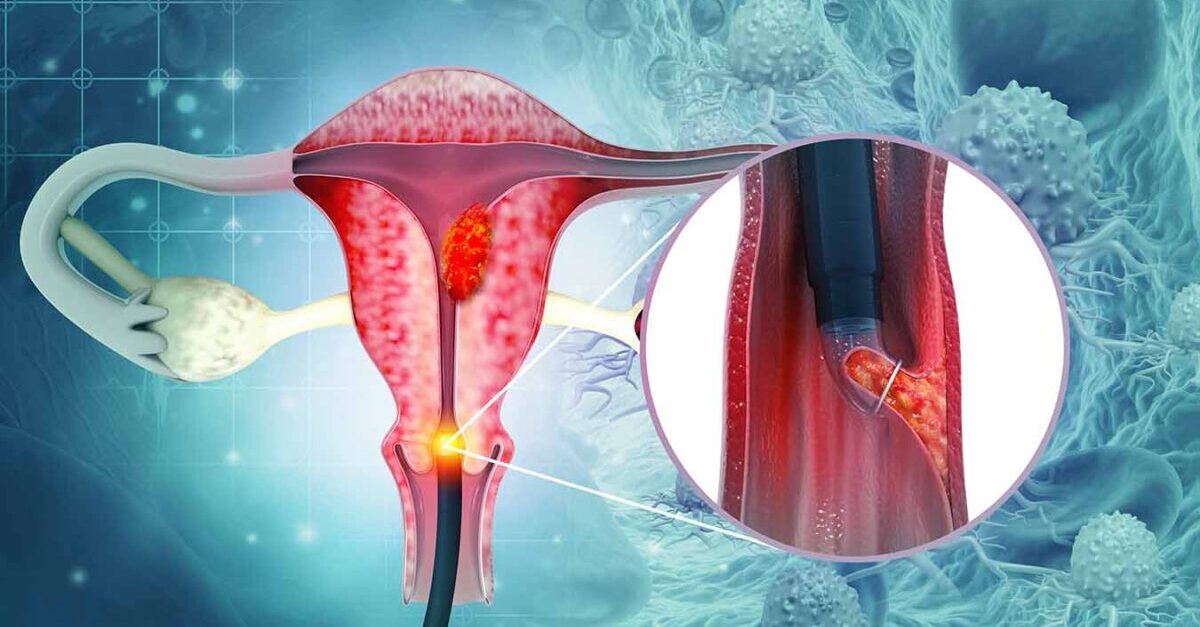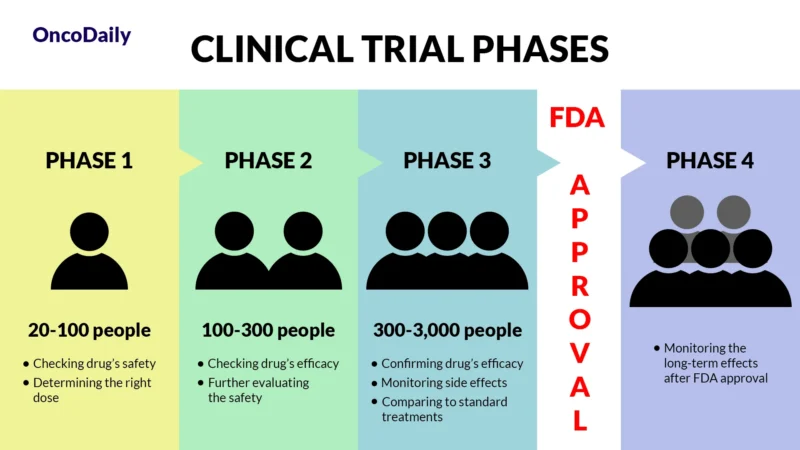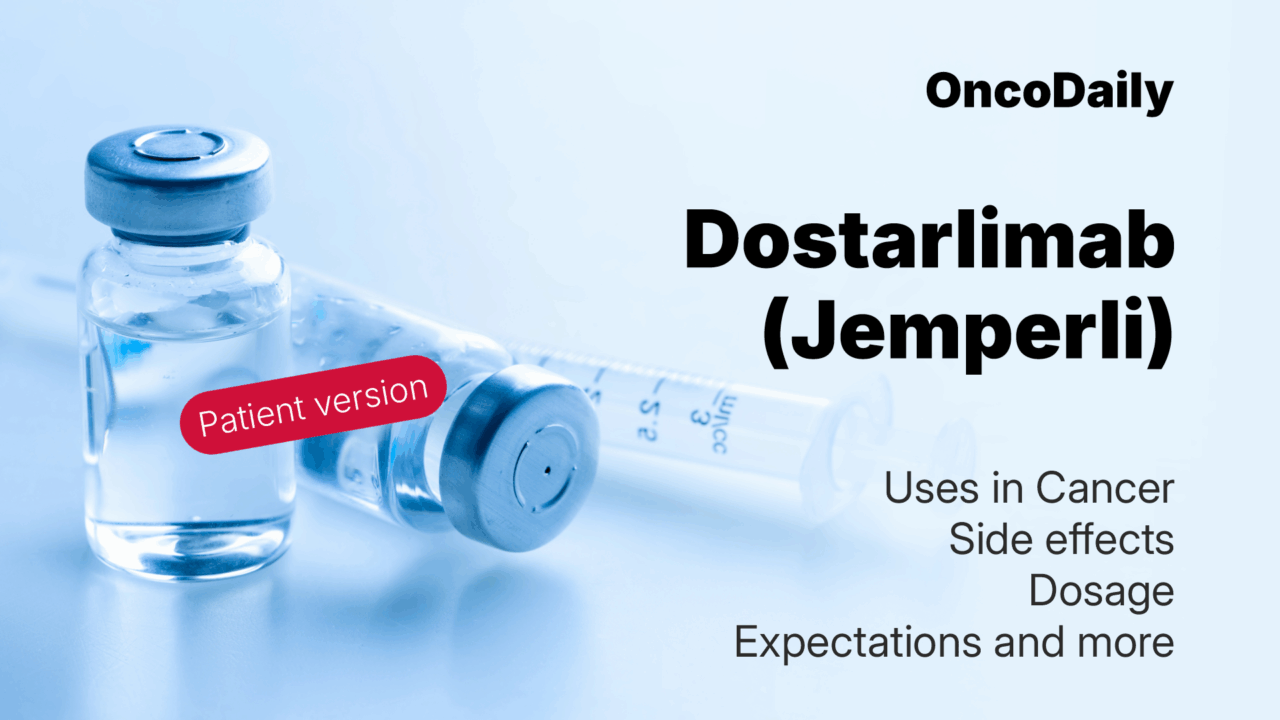Dostarlimab is a type of cancer immunotherapy that helps your immune system fight cancer more effectively. It’s approved by the U.S. Food and Drug Administration (FDA) to treat certain types of advanced or recurrent cancers, especially those with a genetic feature called mismatch repair deficiency (dMMR) or microsatellite instability-high (MSI-H).
This article will help you understand what dostarlimab is, how it works, what cancers it treats, what side effects to expect, and what ongoing research may mean for your treatment.
What Is Dostarlimab and How Does It Work?
Dostarlimab, sold under the brand name Jemperli, is an immunotherapy that belongs to a class of drugs called PD-1 inhibitors. Normally, PD-1 proteins act like a “brake” on the immune system, preventing it from attacking your own body. Some cancer cells take advantage of this by using PD-1 to avoid being detected.
Dostarlimab blocks the PD-1 protein, allowing your immune system—especially T-cells—to find and destroy cancer cells more easily. This is especially useful in cancers that have many genetic mutations, such as those with dMMR or MSI-H, because these tumors are easier for the immune system to recognize. Unlike chemotherapy, which directly kills cancer cells, dostarlimab empowers your body’s own defenses to do the work.
What Types of Cancer Does Dostarlimab Treat?
Dostarlimab is FDA-approved to treat certain advanced or recurrent cancers that have specific genetic mutations. These include:
- Endometrial cancer (cancer of the uterine lining) that is dMMR or MSI-H and has progressed after chemotherapy.
- Any advanced solid tumor with dMMR in adults who have no other satisfactory treatment options.
Most recently, the FDA approved dostarlimab in combination with chemotherapy for primary advanced or recurrent endometrial cancer, regardless of biomarker status. This means it may now benefit a wider group of patients.

Read more about Dostarlimab Plus Chemo Earned Positive CHMP Opinion for Expanded Indication in Advanced Endometrial Cancer on OncoDaily.
How Effective Is Dostarlimab?
Dostarlimab’s effectiveness has been demonstrated in several key clinical trials, showing encouraging response rates and long-term benefits in various cancers. In the GARNET trial, which focused on patients with advanced or recurrent endometrial cancer that was dMMR or MSI-H, dostarlimab showed an overall response rate (ORR) of 42.3%. Of these patients, 12.7% had a complete response, meaning no detectable cancer remained, and 29.6% experienced a partial response, with significant tumor shrinkage. Most patients who responded stayed in remission for at least 6 months, with some remaining disease-free for over 22 months.
A broader analysis from the same study included 209 patients with various dMMR or MSI-H solid tumors, including but not limited to endometrial cancer. The overall response rate in this group was 41.6%, with 44.7% in patients with endometrial cancer and 38.7% in those with other tumor types. The median duration of response in this study was an impressive 35 months, underscoring how long-lasting the benefits of dostarlimab can be.
Another major trial, the RUBY Phase 3 study, looked at combining dostarlimab with standard chemotherapy in patients with advanced or recurrent endometrial cancer. The results were striking. In patients whose tumors were dMMR, 61.4% were still progression-free at two years, compared to only 15.7% of those who received chemotherapy alone. Moreover, 71.3% of patients were alive at two years, a marked improvement from the 56.0% survival rate in the control group.
Even in the broader study population, which included patients regardless of biomarker status, dostarlimab showed meaningful benefits. The median overall survival improved from 28.2 months to 44.6 months when dostarlimab was added to chemotherapy.
These results clearly support the use of dostarlimab, either on its own in biomarker-selected cancers or in combination with chemotherapy, to help control disease, extend survival, and delay recurrence in people with advanced or hard-to-treat cancers.

Learn more about Endometrioid Adenocarcinoma: What patients should know on OncoDaily.
What Is a Clinical Trial and Why Does It Matter?
A clinical trial is a research study designed to test new drugs and treatments in patients to determine their safety and effectiveness. Before Dostarlimab was approved, it went through multiple phases of clinical trials to assess how well it worked, what side effects it caused, and whether it was better than existing treatments. Clinical trials are essential because they provide scientific evidence that a drug can help patients while ensuring it is safe for widespread use.

What Does FDA Approval Mean?
When a drug receives FDA approval, it means that after rigorous testing in clinical trials, it has been shown to be both safe and effective for treating a specific condition. This approval makes the drug widely available for doctors to prescribe and helps patients access new, cutting-edge treatments sooner.
Dostarlimab is an immunotherapy used to treat certain cancers, including advanced or recurrent endometrial cancer. While it can be a powerful tool in cancer treatment, it may also cause side effects. Knowing what to expect—and how to manage it—can help you feel more in control during your treatment journey.
Common Side Effects
The most commonly reported side effect is fatigue. Many patients feel unusually tired during treatment, which may affect daily routines. While rest can help, persistent fatigue should be mentioned to your doctor.
Digestive issues like nausea, vomiting, diarrhea, and constipation are also frequent. These symptoms can often be managed with diet changes or medications. Some patients may notice a reduced appetite, headaches, low-grade fever, or muscle and joint aches. Anemia (low red blood cell count) can cause weakness or shortness of breath. Skin reactions like rashes or itching are usually mild but should still be reported to your care team.
Less Common but Serious Side Effects
In some cases, dostarlimab can cause the immune system to mistakenly attack healthy organs. This might lead to inflammation in the lungs (pneumonitis), liver (hepatitis), intestines (colitis), or thyroid gland (thyroiditis). These conditions can cause symptoms like coughing, stomach pain, or fatigue, but sometimes they show up only in blood tests.
More rarely, the drug may affect your kidneys, pancreas, or hormone levels. You might not notice these changes right away, which is why regular check-ups and lab tests are so important.
Managing Side Effects
Most side effects can be managed when caught early. Fatigue can often be eased with lifestyle adjustments, while nausea or diarrhea can be controlled with medication. Skin problems may be treated with creams. If immune-related side effects occur, your doctor might pause treatment or prescribe steroids to reduce inflammation.
The key is to stay in close contact with your healthcare team and report any new or unusual symptoms, no matter how small they seem. With regular monitoring and open communication, many patients are able to manage side effects and continue benefiting from this innovative therapy.

How Is Dostarlimab Given?
Dostarlimab is given through an intravenous (IV) infusion, which means the medicine is slowly delivered into a vein using a needle and a small tube. Before the infusion, the drug is carefully mixed with a saline or sugar solution and checked to make sure it looks clear and free of particles. The infusion usually takes about 30 minutes and is given through special tubing with a tiny filter to ensure safety. It is important that dostarlimab is not mixed with any other medications in the same IV line, and it should never be given as a quick injection.
What Is the Recommended Dose of Dostarlimab?
For most patients with tumors that have mismatch repair deficiency (dMMR), the usual starting dose is 500 mg every 3 weeks for the first four doses. After that, the dose is increased to 1,000 mg every 6 weeks. In endometrial cancer, dostarlimab can be used alone or together with chemotherapy, depending on the doctor’s treatment plan.
Dose reductions are generally not recommended, but treatment may be paused or stopped if serious side effects occur. Your healthcare provider will monitor your response and adjust your care if needed to keep you safe.
What to Avoid During Dostarlimab Treatment?
While on dostarlimab, it’s important to avoid live vaccines, as your immune system may not respond normally. Always inform your care team about any new symptoms, medications, or supplements you’re taking. Avoid alcohol and consult your doctor before taking over-the-counter medications, as some may interfere with treatment or worsen side effects.
Long-Term Outlook with Dostarlimab
While dostarlimab is not a cure for all cancers, it offers a long-term treatment option that can control cancer growth and significantly extend survival in some patients. In clinical trials, many patients experienced durable responses that lasted more than two years, which is a meaningful achievement in advanced cancer care. Some patients may need to stay on treatment long term, while others may be able to stop after a period of disease stability. Your care team will guide you on the best course of action based on how your cancer responds.
Real-Life Impact: What Patients Are Experiencing?
Outside of clinical trials, patients and doctors are also reporting real-world success with dostarlimab. It has provided meaningful responses in people who had few or no options left, giving them more time and a better quality of life. Ongoing studies will help us understand more about who benefits most and how to make the treatment even more effective.
Looking Ahead – The Future of Dostarlimab
The story of dostarlimab is still being written. Researchers are continuing to explore how it might work in more types of cancer, in earlier stages of disease, or in combination with other therapies to boost its effectiveness. As our understanding of cancer and immunotherapy grows, drugs like dostarlimab offer new hope to patients who need it most.
Ongoing trials with Dostarlimab
Researchers are currently studying dostarlimab in new ways to help more cancer patients. One trial (PULMO-01, NCT06879717) is testing dostarlimab combined with other medicines in patients with advanced lung cancer who didn’t respond to standard treatments. This study is looking at how safe the treatment is and how it affects the immune system.
Another trial (Superhero, NCT06830239) is giving dostarlimab before surgery to patients with certain types of colon cancer to see if it can help shrink tumors or improve outcomes. These studies show that doctors are exploring new uses for dostarlimab to help more people fight cancer.
If you’re a healthcare provider, access the professional version here.


